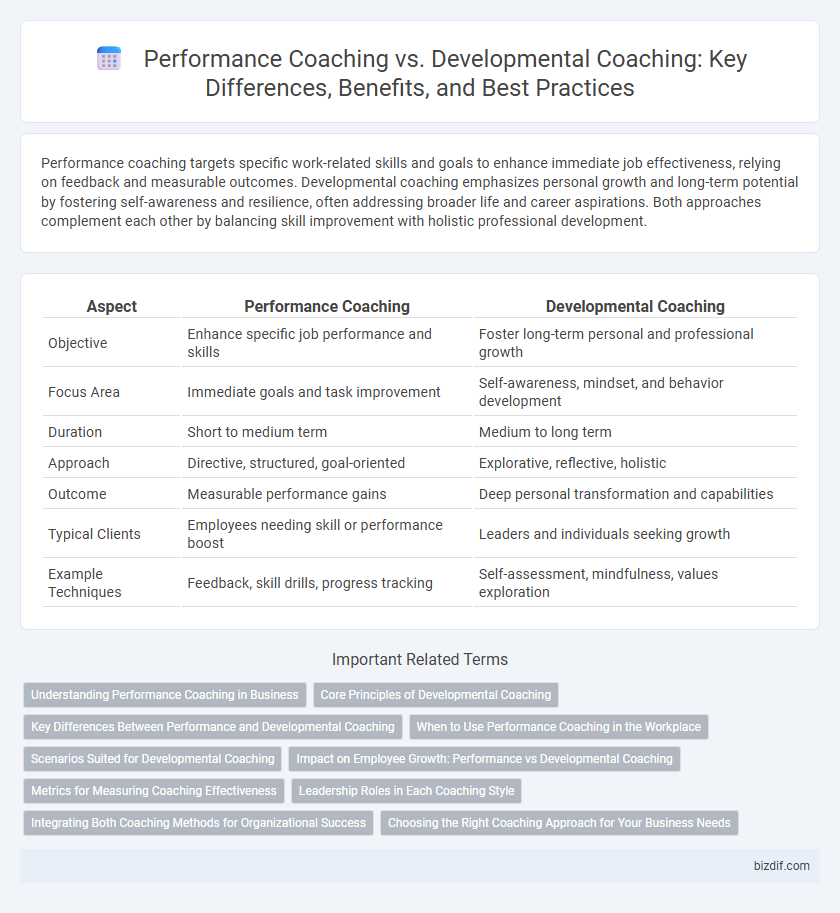Performance coaching targets specific work-related skills and goals to enhance immediate job effectiveness, relying on feedback and measurable outcomes. Developmental coaching emphasizes personal growth and long-term potential by fostering self-awareness and resilience, often addressing broader life and career aspirations. Both approaches complement each other by balancing skill improvement with holistic professional development.
Table of Comparison
| Aspect | Performance Coaching | Developmental Coaching |
|---|---|---|
| Objective | Enhance specific job performance and skills | Foster long-term personal and professional growth |
| Focus Area | Immediate goals and task improvement | Self-awareness, mindset, and behavior development |
| Duration | Short to medium term | Medium to long term |
| Approach | Directive, structured, goal-oriented | Explorative, reflective, holistic |
| Outcome | Measurable performance gains | Deep personal transformation and capabilities |
| Typical Clients | Employees needing skill or performance boost | Leaders and individuals seeking growth |
| Example Techniques | Feedback, skill drills, progress tracking | Self-assessment, mindfulness, values exploration |
Understanding Performance Coaching in Business
Performance coaching in business targets specific skill enhancement and goal achievement to improve productivity and efficiency within defined timeframes. It involves setting measurable objectives, providing ongoing feedback, and applying strategies to optimize employee performance and drive organizational success. This approach contrasts with developmental coaching, which emphasizes long-term personal and professional growth rather than immediate business outcomes.
Core Principles of Developmental Coaching
Developmental coaching centers on fostering long-term growth by enhancing self-awareness, emotional intelligence, and cognitive flexibility, enabling clients to navigate complex challenges and adapt to evolving environments. Core principles include a focus on transformational learning, deep reflective practice, and the cultivation of intrinsic motivation, which differentiate it from performance coaching's goal-oriented, task-specific approach. Emphasizing mindset shifts and expanded perspectives, developmental coaching supports sustained personal and professional evolution beyond immediate performance outcomes.
Key Differences Between Performance and Developmental Coaching
Performance coaching concentrates on enhancing specific skills and achieving immediate work-related goals through targeted feedback and measurable outcomes. Developmental coaching focuses on long-term personal growth, self-awareness, and expanding capabilities beyond current job requirements by fostering deeper reflection and mindset shifts. The key differences lie in their time orientation, scope--performance coaching is task-oriented, while developmental coaching is growth-oriented--and the nature of change, with performance coaching driving short-term improvement and developmental coaching supporting transformational change.
When to Use Performance Coaching in the Workplace
Performance coaching is most effective in the workplace when employees need to improve specific skills, meet clear performance targets, or address immediate challenges impacting their productivity. This approach focuses on measurable outcomes, providing structured feedback and actionable strategies to enhance job performance. Organizations leverage performance coaching to boost efficiency, correct performance gaps, and align employee contributions with business goals.
Scenarios Suited for Developmental Coaching
Developmental coaching is best suited for scenarios where individuals aim to enhance self-awareness, emotional intelligence, and long-term personal growth. It supports navigating complex life transitions, improving leadership capabilities, and fostering resilience in challenging environments. Organizations often leverage developmental coaching to cultivate future leaders and promote sustained performance improvement over time.
Impact on Employee Growth: Performance vs Developmental Coaching
Performance coaching targets enhancing specific job skills and meeting immediate organizational goals, driving measurable improvements in employee productivity and output. Developmental coaching fosters long-term employee growth by cultivating critical thinking, emotional intelligence, and leadership abilities, enabling sustained career advancement. Combining both approaches creates a balanced strategy that accelerates skill enhancement while nurturing personal and professional development.
Metrics for Measuring Coaching Effectiveness
Performance coaching effectiveness is primarily measured using key performance indicators (KPIs) such as productivity increases, goal completion rates, and measurable improvements in specific skill sets. Developmental coaching effectiveness focuses on long-term indicators like behavioral change, emotional intelligence growth, and enhanced leadership capabilities, often assessed through 360-degree feedback and self-assessments. Combining quantitative metrics with qualitative insights provides a comprehensive evaluation of coaching impact on both immediate performance and ongoing personal development.
Leadership Roles in Each Coaching Style
Performance coaching targets specific leadership skills improvement and measurable outcomes, optimizing leaders' efficiency and decision-making in critical roles. Developmental coaching emphasizes long-term growth, emotional intelligence, and self-awareness, nurturing transformational leadership qualities for adaptive and visionary roles. Leaders engaging in performance coaching excel in tactical execution, while those in developmental coaching cultivate strategic influence and resilience.
Integrating Both Coaching Methods for Organizational Success
Integrating performance coaching and developmental coaching leverages immediate goal achievement with long-term skill enhancement, fostering a balanced approach to employee growth. Organizations that combine these methods see improved productivity and sustained professional development, leading to higher employee engagement and retention rates. This strategic integration aligns individual capabilities with organizational objectives, driving overall business success.
Choosing the Right Coaching Approach for Your Business Needs
Performance coaching targets immediate skill enhancement and goal achievement to boost workplace productivity, while developmental coaching focuses on long-term personal growth and leadership capacity building. Selecting the right coaching approach depends on your business priorities--performance coaching suits urgent operational improvements, whereas developmental coaching aligns with strategic talent cultivation. Evaluating current organizational challenges and future growth plans ensures the coaching investment delivers maximum impact.
Performance Coaching vs Developmental Coaching Infographic

 bizdif.com
bizdif.com